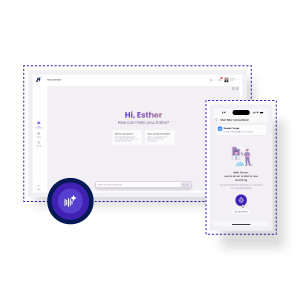The security level and compliance standards of your medical transcription system demand assessment. Medical staff routinely work with highly sensitive patient information so safety and confidentiality requirements become absolute priorities in their work. This article demonstrates how HIPAA-compliant transcription software matters in medical transcription while identifying the risks posed by non-compliance and describes how HealthOrbit AI provides efficient secure practices.
The Role of HIPAA in Medical Transcription
HIPAA serves as a medical safety regulation that protects private patient details by imposing strict security rules for healthcare institutions. Patient data handling entities which include Medical transcription companies need to follow HIPAA rules to stop data breaches and unauthorized data access and avoid legal troubles. AI-powered documentation tools provide several benefits to their users to streamline their routine.
Key HIPAA Requirements for Medical Transcription:
- Patient information needs mandatory encryption for both data exchange throughout the transmission process and data storage operations.
- Authorized personnel are the only individuals who should access records of transcription data.
- Medical systems must maintain precise logs for tracking system users and the changes they make.
- Data must be placed in HIPAA-compliant servers that implement multiple layers of security protocols.
Risks of Non-Compliance in Medical Transcription
Medical providers, transcription companies and all patients experience serious adverse effects when HIPAA standards remain unmet. Several major hazards exist when medical organizations fail to comply with HIPAA regulations.
Data Breaches and Cybersecurity Threats
The critical nature of patient data in medical transcription companies established it as the number one target for cyber hackers. You must be wondering, how AI medical scribes maintain patient privacy. Unsecure transcription software allows hackers to breach protected health information (PHI) because they use its security vulnerabilities.
The disclosure of protected health information through non-compliance will permit criminals to initiate identity theft events and file unauthorized medical claims which result in substantial bodily injuries to patients.
Legal and Financial Penalties
Financial penalties exist as a direct consequence of breaking HIPAA regulations. The U.S. The Department of Health and Human Services (HHS) establishes HIPAA violation penalties through fines that amount to $100 for each incident and extend to $50,000 for individual offenses and reach an annual maximum of $1.5 million.
The law allows progressions of strict penalties toward charges of criminal negligence when an organization keeps noncompliance violations repeated.
Loss of Patient Trust and Reputation Damage
The failure to maintain HIPAA compliance at any point leads to severe harm of a healthcare provider’s professional standing. Sufferers anticipate their private medical information to remain protected at all times. An organization’s failure to protect patient data disables its ability to retain patients as well as to generate new referrals from existing patients.
Increased Administrative Burden
Data breaches together with non-compliance issues force healthcare organizations into multiple demanding investigations which follow up with audits before they can start the remediation processes. Healthcare providers together with transcription companies need to spend considerable amounts on security system overhauls and staff retraining while implementing costly corrective procedures which produce expensive financial effects against operational inefficiencies.
Disruptions to Healthcare Services
Threats to healthcare operations may arise from compliance breaches because they trigger two main consequences: temporary document transcription restrictions heightened regulatory inspection and possible court actions. The healthcare equipment workflow suffers delays that affect patient care delivery and lead to lower operational efficiency throughout health institutions.
How HealthOrbit AI is Revolutionizing Medical Transcription
HealthOrbit AI Medical transcription tool provides benefits to its users. The HealthOrbit AI offering stands as a modern HIPAA-compliant transcription software that delivers both efficiency together with security features.
Key Features of HealthOrbit AI:
- Doctors can use AI-based medical transcription services to produce precise clinical notes by automatically transcribing their live patient conversations.
- This automated system helps maintain ICD-10 and CPT standards to boost billing operations.
- Doctor Copilot delivers immediate notifications for patient follow-ups as well as providing clinical decision recommendations.
- Multi-Device & Multi-Language Support: Accessible across platforms with support for multiple languages.
- EHR Integration permits smooth connection between HealthOrbit AI and electronic health record systems to boost operating efficiency.
Ensuring HIPAA Compliance with HealthOrbit AI
All medical transcription service operations by HealthOrbit AI satisfy HIPAA requirements because of its strict regulations.
- The system encrypts all data communication through end-to-end encryption protocols.
- Strict User Authentication protocols for secure access.
- HealthOrbit conducts recurring audits that protect client compliance.
- Seamless EMR/EHR Integration for a unified documentation process.
Conclusion
Hospitals must implement HIPAA compliance in their medical transcription work as this requirement becomes more than a suggestion but a basic standard. Policymakers and cyber threats have encouraged medical professionals to use HealthOrbit AI as their HIPAA-compliant transcription software which provides secure data protection together with regulatory adherence and superior operational performance.
FAQs
What is the best medical dictation software?
HealthOrbit AI stands as a premium medical dictation software system that combines automatic transcription capabilities with HIPAA standards and a complete EHR connection to create secure automated documentation.
How does HealthOrbit AI ensure HIPAA compliance?
HealthOrbit AI implements three security features including end-to-end data encryption as well as strict user authentication protocols together with real-time threat monitoring to fulfill all HIPAA standards for patient data protection.
Can HealthOrbit AI integrate with EHR?
HealthOrbit AI operates through major EHR systems to offer healthcare professionals simplified procedures and lowered administrative workloads.
What are the benefits of using AI-powered medical transcription?
The implementation of AI-powered transcription technology leads to increased accuracy and accelerated documentation and decreased errors alongside compliance assurance and saves approximately 40% of manual transcription time.Is HealthOrbit AI suitable for multi-specialty practices?
Absolutely! HealthOrbit AI supports multiple medical specialties, offers multi-language capabilities, and works across various devices, making it ideal for diverse healthcare settings.,.




